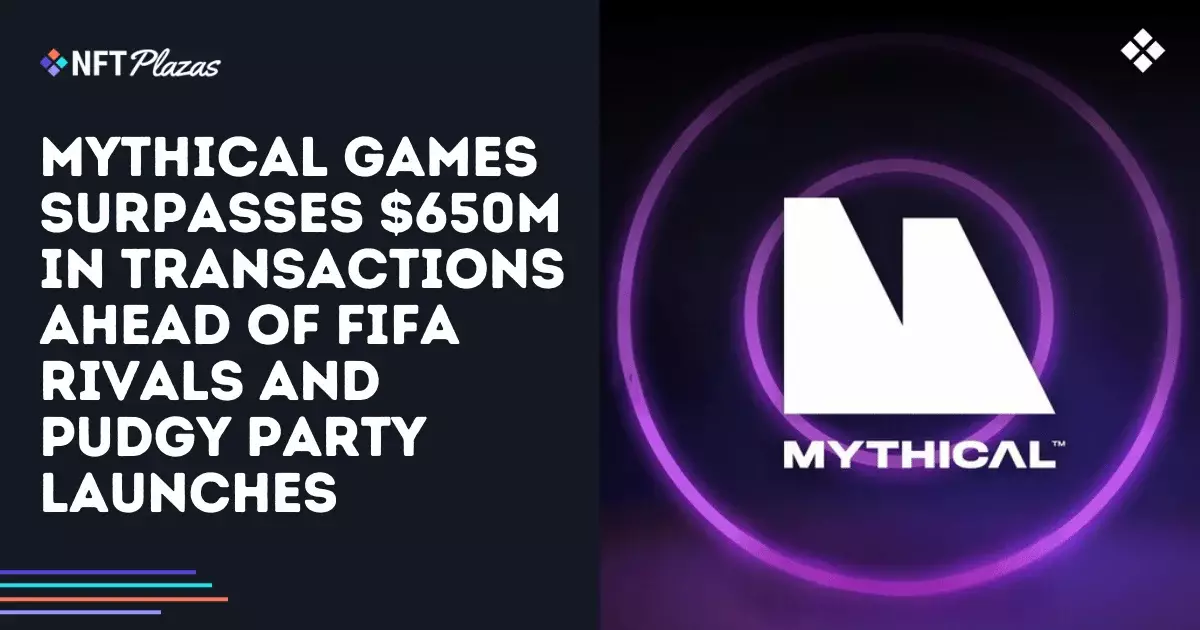In a world where innovation collides with tradition, Mythical Games has emerged with impressive momentum, recently announcing that it has crossed a staggering $650 million in total transaction volume across its developing platform. This achievement, fueled by over 7 million registered users, reflects a potent shift in the gaming landscape, particularly as we edge closer to the launch of two promising mobile games in 2025: FIFA Rivals and Pudgy Party. However, beneath the glossy surface of this gaming startup lies an intriguing narrative about the future of gaming—a narrative that blurs the lines between play and investment.
Blockchain Infusion: A Game Changer or a Step Too Far?
At the core of Mythical Games’ identity is its pioneering use of blockchain technology. Founded in 2018 by erstwhile Activision veterans, the studio’s approach mimics a well-crafted potion—mixing traditional gaming elements with the innovative possibilities afforded by the blockchain. Games like Blankos Block Party and NFL Rivals showcase unique character ownership and asset trading, a model that some players embrace passionately, while others criticize for its potential to introduce speculative dimensions to gaming.
For many players, the idea of collecting digital assets can add to the thrill of gaming, creating a sense of ownership previously missing from conventional titles. But this comes with risks. The involvement of cryptocurrencies and digital asset trading could inadvertently turn gaming from a recreational pursuit into a financial gamble. Will we soon see players obsess over the monetary value of their digital trophies instead of the sheer joy of gameplay? The line between entertainment and investment is perilously thin, and while Mythical Games aims to present a user-friendly interface devoid of overt crypto complexities, one must question if this is just a facade for monetization.
The Mobile Frontier: Capturing a Global Audience
With plans to unleash FIFA Rivals and Pudgy Party on mobile platforms, Mythical Games is clearly targeting a colossal market that has consistently outperformed traditional gaming segments. FIFA Rivals promises arcade-style matches and digital trading cards – elements designed to ignite not only fan engagement but also the competitive spirit inherent in sports. Yet, it begs the question: Is Mythical seeking to innovate, or is it merely riding the coattails of established franchises for quick gains?
The mobile gaming sector is not only robust but saturated. While Mythical Games’ historic success with NFL Rivals gained traction, the competition is fierce, and newcomers could easily overshadow their offerings. Without a truly groundbreaking user experience, the studio risks slipping into the sea of forgettable mobile games. Additionally, launching two new titles simultaneously raises validity concerns; will they both deliver quality experiences, or will they spread resources too thin?
The Mythical Marketplace: An Upscale Trading Ground or a Digital Jungle?
The evolution of the Mythical Marketplace, especially following the acquisition of DMarket, represents a giant leap in their platform capabilities. Users now have a more sophisticated avenue to trade assets, transforming gaming from mere participation to an active marketplace filled with opportunities. But it is essential to interrogate this development critically.
While the potential for players to monetize their engagement is alluring, the implications are complex. This dynamic could draw in players who view gaming as an investment; newcomers might feel intimidated by an ecosystem too focused on making money instead of purely enjoying the gameplay. The question then becomes: can Mythical Games uphold the sanctity of gaming as a form of entertainment while catering to a market increasingly focused on financial returns?
Looking Ahead: The Dynamics of IP Partnerships and Gaming Evolution
As Mythical gears up for the launch of FIFA Rivals and Pudgy Party, the possibilities for future partnerships with major intellectual property (IP) holders become a tantalizing prospect. However, it is crucial to consider how these collaborations will shape the gaming experience and whether they will benefit the consumer or contribute to the commercialization of gaming culture. The landscape is shifting, and while opportunities abound, they must be approached with caution and a clear vision of what aspects of gaming are most valuable.
The road ahead is rife with potential but fraught with pitfalls. Mythical Games stands at a pivotal juncture, charting a course that could redefine entertainment for a generation. As they navigate this path, the overarching concern will remain: can the integrity of gaming as an art form withstand the pressures of market demands and a culture increasingly woven into financial oscillations? Only time will reveal the true implications of this new gaming paradigm.

